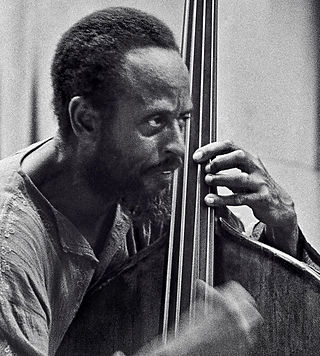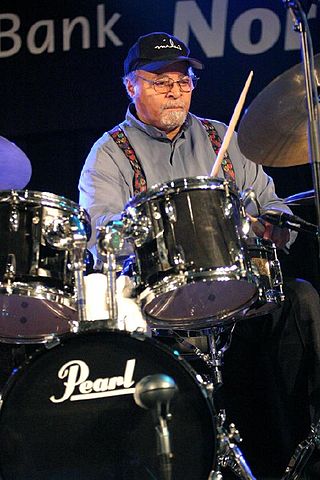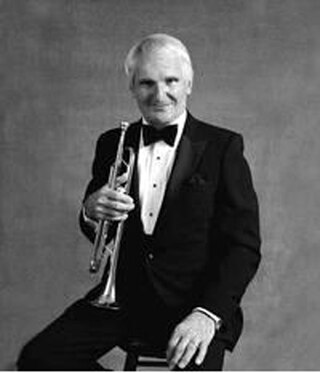
Bebop or bop is a style of jazz developed in the early to mid-1940s in the United States. The style features compositions characterized by a fast tempo, complex chord progressions with rapid chord changes and numerous changes of key, instrumental virtuosity, and improvisation based on a combination of harmonic structure, the use of scales and occasional references to the melody.

Oscar Pettiford was an American jazz double bassist, cellist and composer. He was one of the earliest musicians to work in the bebop idiom.

Theodore "Fats" Navarro was an American jazz trumpet player and a pioneer of the bebop style of jazz improvisation in the 1940s. A native of Key West, Florida, he toured with big bands before achieving fame as a bebop trumpeter in New York. Following a series of studio sessions with leading bebop figures including Tadd Dameron, Bud Powell, and Kenny Clarke, he became ill with tuberculosis and died at the age of 26. Despite the short duration of his career, he had a strong stylistic influence on trumpet players who rose to fame in later decades, including Clifford Brown and Lee Morgan.

Eli "Lucky" Thompson was an American jazz tenor and soprano saxophonist whose playing combined elements of swing and bebop. Although John Coltrane usually receives the most credit for bringing the soprano saxophone out of obsolescence in the early 1960s, Thompson embraced the instrument earlier than Coltrane.

Percy Heath was an American jazz bassist, brother of saxophonist Jimmy Heath and drummer Albert Heath, with whom he formed the Heath Brothers in 1975. Heath played with the Modern Jazz Quartet throughout their long history and also worked with Miles Davis, Dizzy Gillespie, Charlie Parker, Wes Montgomery, Thelonious Monk and Lee Konitz.

Sonny Stitt was an American jazz saxophonist of the bebop/hard bop idiom. Known for his warm tone, he was one of the best-documented saxophonists of his generation, recording more than 100 albums. He was nicknamed the "Lone Wolf" by jazz critic Dan Morgenstern because of his tendency to rarely work with the same musicians for long despite his relentless touring and devotion to the craft. Stitt was sometimes viewed as a Charlie Parker mimic, especially earlier in his career, but gradually came to develop his own sound and style, particularly when performing on tenor saxophone and even occasionally baritone saxophone.

Robert Roland Chudnick, known professionally as Red Rodney, was an American jazz trumpeter.

Charles James Shavers was an American jazz trumpeter who played with Dizzy Gillespie, Nat King Cole, Roy Eldridge, Johnny Dodds, Jimmie Noone, Sidney Bechet, Midge Williams, Tommy Dorsey, and Billie Holiday. He was also an arranger and composer, and one of his compositions, "Undecided", is a jazz standard.

Wilbur James "Jimmy" Cobb was an American jazz drummer. He was part of Miles Davis's First Great Sextet. At the time of his death, he had been the Sextet's last surviving member for nearly thirty years. He was awarded an NEA Jazz Masters Fellowship in 2009.

Secondo "Conte" Candoli was an American jazz trumpeter based on the West Coast. He played in the big bands of Woody Herman, Stan Kenton, Benny Goodman, and Dizzy Gillespie, and in Doc Severinsen's NBC Orchestra on The Tonight Show Starring Johnny Carson. He played with Gerry Mulligan, and on Frank Sinatra's TV specials. He also recorded with Supersax, a Charlie Parker tribute band that consisted of a saxophone quintet, the rhythm section, and either a trumpet or trombone.

Charlie Ventura was an American tenor saxophonist and bandleader from Philadelphia, Pennsylvania, United States.
Carlo Jackie Paris was an American jazz singer and guitarist. He is best known for his recordings of "Skylark" and "'Round Midnight" from the late 1940s to the early 1950s.

William Henry Bauer was an American jazz guitarist.

Ernest Harold "Benny" Bailey was an American jazz trumpeter.

Charles Lawrence Persip, known as Charli Persip and formerly as Charlie Persip, was an American jazz drummer.
Joseph Henry Gordon was an American jazz trumpeter.

Arvin Charles Garrison was an American jazz guitarist. He was born in Toledo, Ohio, and spent most of his life there.
Justin Robinson is an American alto saxophonist. He has performed with artists such as the Harper Brothers, Cecil Brooks III, Abbey Lincoln, Diana Ross, Little Jimmy Scott, the Carnegie Hall Jazz Band, the Dizzy Gillespie All Star Band and was a member of the quintet and big band of trumpeter Roy Hargrove.

The Complete RCA Victor Recordings is a 1995 compilation 2-CD set of sessions led by Jazz trumpeter and composer Dizzy Gillespie recorded for the RCA Victor label between 1937 and 1949.
















